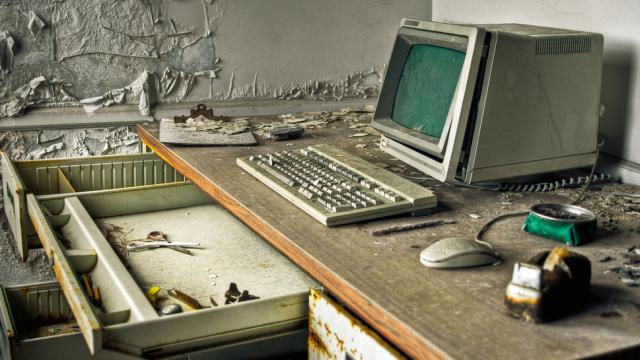Parts of it would die within a couple of days; if your access to it remained operational, some of it might remain partially usable for a year or two. All large complex systems require constant maintenance by huge staffs of intelligent people, and the internet is no exception. Like you’ve seen in future-dystopian sci-fi movies, infrastructure like this will slowly crumble.
The internet itself depends on two major other infrastructures — power and data communication networks as well as the computer servers themselves that implement the data services of the internet (having a network without operational computers to talk to will be as useful to you as the telephone network without any other humans around to talk to).
Sure, dams, turbines and nukes will continue to generate power, but not forever. Any storms that knock down power lines will never be fixed; most power plants will probably shut themselves down automatically due to lack of human operators making fine adjustments to keep critical failures from happening.
Some dams will destroy themselves at the next wet season because large time-scale adjustments — such as lowering reservoirs in anticipation of spring melt flooding — tend not to be automated. The movement of coal at coal plants is probably done by people, not automated (and of course delivery of fuel to coal plants depends on human-controlled trains and ships). When power goes, the UPSs and backup power generators at data centres and in the telco infrastructure are only good for a few hours.
Sure the phone/fibre networks will continue to work, probably for months or years, but not forever (components and cables fail constantly due to natural degradation and are repaired/replaced constantly — by people).
Computers (the servers that implement the data on “the internet”) can run, at best, for a few years before they get clogged with dust or a component fails. More likely the cooling towers that cool the data centres containing those computers will, without maintenance, clog up with algae and other natural muck within a matter of weeks to months, causing the cooling systems to fail and the computers to overheat and die (unless they don’t first shut themselves down automatically, that is).
The internet itself relies on other internet infrastructure — for example, time servers and DNS servers, which suffer from these same risks. Despite the much-touted resilience of TCP/IP for example, if just the three “redundant” DNS servers that a data center relies upon all go down, that site goes down too, so there’s actually a fragility or cascading-effect when failures accumulate due to power, data, and computer failures elsewhere.
Only a few computerized systems are actually built to such high quality and reliability end-to-end that they will run perfectly for decades (nuclear launch control systems, pacemakers, and satellites come to mind — note that these are hard or impossible to maintain). The internet just isn’t built to that kind of quality.
“What would happen to the Internet if mankind disappeared?” originally appeared on Quora: “Ask a question, get a great answer. Learn from experts and get insider knowledge.” You can follow Quora on Twitter, Facebook and Google+.
This answer has been lightly edited for grammar and clarity.
Picture: Shutterstock/carl ballou
